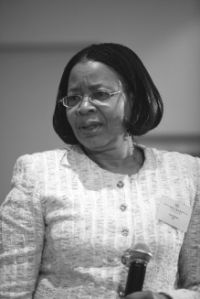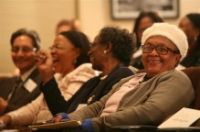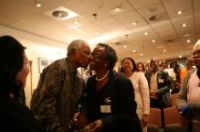
Graça Machel.
(Image: Nelson Mandela Foundfation)Four women who played major roles in the struggle shared their memories, ranging from organising the 1956 Women’s March to the Union Buildings to making bombs in the kitchen, with an invited audience at the Nelson Mandela Foundation on May 30, 2007.
While Ms Sophia Williams-De Bruyn, Mrs Amina Cachalia, Mrs Rica Hodgson and Dr Ntombemhlophe Bam were reminiscing about how they sold scones and knitted to raise enough money to transport women to the march, Mr Nelson Mandela dropped in to give them and their audience of about 50 people from civil society, government and academia, his best wishes.
“These ladies played a very important role in the struggle,” said Mr Mandela. “Some of us can’t measure up to the sacrifices they made,” he added.
The dialogue was organised by the Foundation’s Centre of Memory and Dialogue, to share and record the memories of these women. Stalwart activists Mrs Bertha Gxowa and Mrs Vesta Smith were also in the audience.
The dialogue was convened around an exhibition currently on display at the foundation entitled Malibongwe (“we thank the women”), incorporating striking black and white photographs of women activists and curated by the Apartheid Museum.

Vesta "MaV" Smith.
(Image: © John Hogg)The audience loved the stalwarts’ tales, including one about how Ms Lilian Ngoyi and Ms Helen Joseph were called in before the march by the ANC leadership, who were male, and asked to explain what they were doing and whether they had a plan if arrested. “We didn’t tell them that if the police arrested us, we had a plan for all the women to start praying,” laughed Ms Williams-De Bruyn.
“These ladies played a very important role in the struggle…Some of us can’t measure up to the sacrifices they made.” – Mr Nelson Mandela
“I think this is a good thing,” said Mrs Gxowa after the morning session. “Maybe next time with something like this, we should take it to the women of the townships, at the grass roots, and not just for two hours, but five hours.”
Mrs Hodgson added, “I agree that this kind of dialogue must be carried on. What appals me is that when you speak to young people, they don’t know of the Treason Trial [for which she raised funds for the defendants], and of the People’s Congress. We need to record our stories for history, and not for ourselves.”

Nelson Mandela greets Bertha Gxowa.
(Image: © John Hogg)Mr Achmat Dangor, CEO of the Foundation, said, “The people who participated are the custodians of important memories, which are rich and valuable.”
One of the schoolchildren present said, “I’m very overwhelmed to be in the presence of such great women. Us girls, we experience the freedom that they fought for.”
Mrs Sibongile Mkhabela, who is CEO of the Nelson Mandela Children’s Fund, said of the dialogue session, “It underlined the need to begin the conversation between generations.”
Mrs Graça Machel gave a vote of thanks at the end. “This kind of dialogue should continue. You can write a book, but there’s nothing that replaces direct contact and conversation.”
Said dialogue organiser, Ms Mothomang Diaho, “There’s no debate: we have to continue this.”